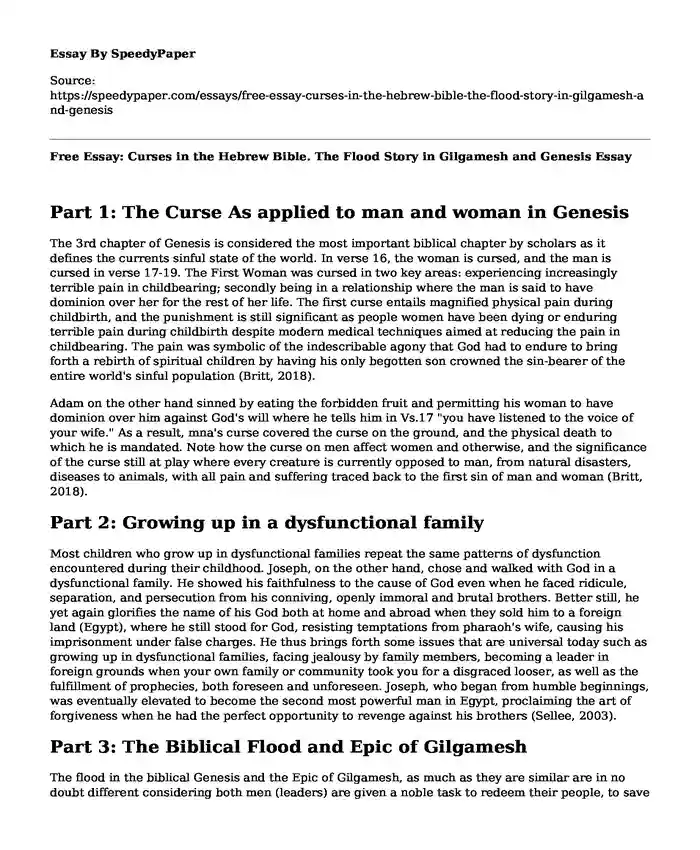Part 1: The Curse As applied to man and woman in Genesis
The 3rd chapter of Genesis is considered the most important biblical chapter by scholars as it defines the currents sinful state of the world. In verse 16, the woman is cursed, and the man is cursed in verse 17-19. The First Woman was cursed in two key areas: experiencing increasingly terrible pain in childbearing; secondly being in a relationship where the man is said to have dominion over her for the rest of her life. The first curse entails magnified physical pain during childbirth, and the punishment is still significant as people women have been dying or enduring terrible pain during childbirth despite modern medical techniques aimed at reducing the pain in childbearing. The pain was symbolic of the indescribable agony that God had to endure to bring forth a rebirth of spiritual children by having his only begotten son crowned the sin-bearer of the entire world's sinful population (Britt, 2018).
Adam on the other hand sinned by eating the forbidden fruit and permitting his woman to have dominion over him against God's will where he tells him in Vs.17 "you have listened to the voice of your wife." As a result, mna's curse covered the curse on the ground, and the physical death to which he is mandated. Note how the curse on men affect women and otherwise, and the significance of the curse still at play where every creature is currently opposed to man, from natural disasters, diseases to animals, with all pain and suffering traced back to the first sin of man and woman (Britt, 2018).
Part 2: Growing up in a dysfunctional family
Most children who grow up in dysfunctional families repeat the same patterns of dysfunction encountered during their childhood. Joseph, on the other hand, chose and walked with God in a dysfunctional family. He showed his faithfulness to the cause of God even when he faced ridicule, separation, and persecution from his conniving, openly immoral and brutal brothers. Better still, he yet again glorifies the name of his God both at home and abroad when they sold him to a foreign land (Egypt), where he still stood for God, resisting temptations from pharaoh's wife, causing his imprisonment under false charges. He thus brings forth some issues that are universal today such as growing up in dysfunctional families, facing jealousy by family members, becoming a leader in foreign grounds when your own family or community took you for a disgraced looser, as well as the fulfillment of prophecies, both foreseen and unforeseen. Joseph, who began from humble beginnings, was eventually elevated to become the second most powerful man in Egypt, proclaiming the art of forgiveness when he had the perfect opportunity to revenge against his brothers (Sellee, 2003).
Part 3: The Biblical Flood and Epic of Gilgamesh
The flood in the biblical Genesis and the Epic of Gilgamesh, as much as they are similar are in no doubt different considering both men (leaders) are given a noble task to redeem their people, to save humankind, actions for which they are rewarded eventually. Notably, the underlying events occurring in both stories, however, shallow the details, are somewhat similar because the narratives detail the relationship between Divinity and humans. In both stories, the Divine being commissioned the floods to wipe-out humanity. On the same note, both heroes, Noah and Gilgamesh, were under obligation to build a safe haven for the people. However, both floods were meant to be symbols as a new beginning or a rebirth to what God and the Divinity thought was a crumbling world. The stories are nonetheless dissimilar to a given extent because, in Genesis, God commissioned the flood to destroy humankind as a result of the ever-increasing wickedness in the world. Unlike the Genesis story where the reason for the flood was well declared, no explanation or explanation was given in the Epic of Gilgamesh where the sender of the floods was brought up in a secret council of gods by the god of air, wind, and earth, Enlil. In the epic of Gilgamesh therefore, most scholars assume that the floods were as a result of natural causes. Whereas Noah was called because of his righteousness to build the ark, Utnapishtim was selected out of the wisdom of Crafts, god of wisdom and Ea. Repopulation occurred through marriage among the family members of Noah in the Genesis story while in the Epic of Gilgamesh, he brought with him his family members and all craftsmen who reproduced later to form the current generation to whom modern violence is attributed to as a generational character (Public.iastate.edu, 2018).
References
Britt, B.M. (2018). Curses in the Hebrew Bible. (2018). Retrieved 5 September 2018, from https://www.bibleodyssey.org/people/related-articles/curses-in-the-hebrew-bible
Public.iastate.edu (2018). The Flood Story in Gilgamesh and Genesis.Retrieved 5 September 2018, from http://www.public.iastate.edu/~gbetcher/353/gilgfld.htm
Sellee, J. B. (2003). The theme (s) of the Joseph story: a literary analysis (Doctoral dissertation, University of Gloucestershire).
Cite this page
Free Essay: Curses in the Hebrew Bible. The Flood Story in Gilgamesh and Genesis. (2022, Jul 12). Retrieved from https://speedypaper.com/essays/free-essay-curses-in-the-hebrew-bible-the-flood-story-in-gilgamesh-and-genesis
Request Removal
If you are the original author of this essay and no longer wish to have it published on the SpeedyPaper website, please click below to request its removal:
- Free Essay on Leadership Competencies
- Legalization of Marijuana Essay Sample for Everyone
- Cultural Beliefs in Early Childhood Education
- Essay Sample on Second Language Class Evaluation
- Essay Example on Differences in Hazards
- Free Essay Example. Confidentiality Is an Issue
- How Do Labor Laws Affect Businesses Now? - Essay Sample
Popular categories





